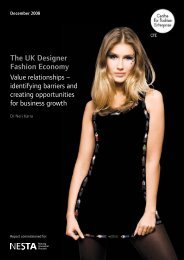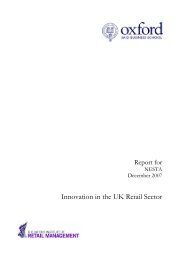Everyday innovation report - Nesta
Everyday innovation report - Nesta
Everyday innovation report - Nesta
You also want an ePaper? Increase the reach of your titles
YUMPU automatically turns print PDFs into web optimized ePapers that Google loves.
44<br />
35. Patterson, F. et al. (2009)<br />
Op cit.<br />
36. Lucas, B. and Claxton, G.<br />
(2009) ‘Wider Skills for<br />
Learning: What are they,<br />
how can they be cultivated,<br />
how could they be measured<br />
and why are they important<br />
for <strong>innovation</strong>?’ NESTA<br />
Research Report. London:<br />
NESTA.<br />
37. Department for Innovation,<br />
Universities and Skills (2008)<br />
Op. cit.<br />
38. 38 Chell, E. and Athayde, R.<br />
(2009) Op. cit.<br />
Part 7: Summary and final reflections<br />
7.1 Summary and final reflections<br />
How does this evidence help corporate<br />
policymakers in understanding how to<br />
introduce, encourage and sustain innovative<br />
working in organisations? The research<br />
literature review and survey <strong>report</strong> explores<br />
several implications for working practices but<br />
with a particular focus on organisational HR<br />
interventions. 35 These include:<br />
• employee attraction<br />
• employer reputation and brand<br />
• organisational culture and climate surveys for<br />
<strong>innovation</strong><br />
• recruitment strategies<br />
• induction programmes and early socialisation<br />
• selection and assessment for <strong>innovation</strong><br />
• development and skills for <strong>innovation</strong><br />
• social networks and knowledge sharing<br />
• work design<br />
• motivating innovative employees<br />
The need to raise skills levels to support<br />
<strong>innovation</strong> in the UK is generally<br />
acknowledged. However, as pointed out by<br />
Lucas and Claxton 36 these are often “bland<br />
statements about ‘unlocking talent’”, which<br />
provide little direction for HR policy and<br />
practice. Similarly, they highlight that although<br />
the Innovation Nation White Paper 37 was<br />
one of the few government White Papers to<br />
include a reference to ‘innovative people’<br />
the specifics regarding skills and behaviours<br />
required were severely limited. This current<br />
<strong>report</strong> commissioned by NESTA reflects the<br />
desire to understand more about the specific<br />
role of ‘people’ behaviours and <strong>innovation</strong> in<br />
organisations. To summarise, our key findings<br />
are provided below and future areas for<br />
research, policy and practice are suggested.<br />
Assertion 1. Skills and behaviours that<br />
contribute to innovative working in<br />
organisations can be identified and<br />
measured reliably.<br />
This <strong>report</strong> provides a detailed analysis of<br />
the skills and behaviours that contribute to<br />
innovative working in organisations. Evidence<br />
from the literature review, survey <strong>report</strong> and<br />
interviews provides a clear indication of the<br />
skills, behaviours and attitudes that predict<br />
innovative working and indeed points to<br />
empirically validated psychometrics to assess<br />
these in the workplace.<br />
In a recent NESTA research <strong>report</strong>, the<br />
identification and measurement of innovative<br />
characteristics of young people was piloted. 38<br />
On the surface the innovative characteristics<br />
identified appear similar (creativity, selfefficacy,<br />
energy, risk propensity and leadership)<br />
to those established in the workplace with<br />
an adult population. This will help direct<br />
education policy on skills development for<br />
the future. There are differences however in<br />
the behaviours found observing young people<br />
within a school context to those observed in<br />
the workplace with an adult population.







